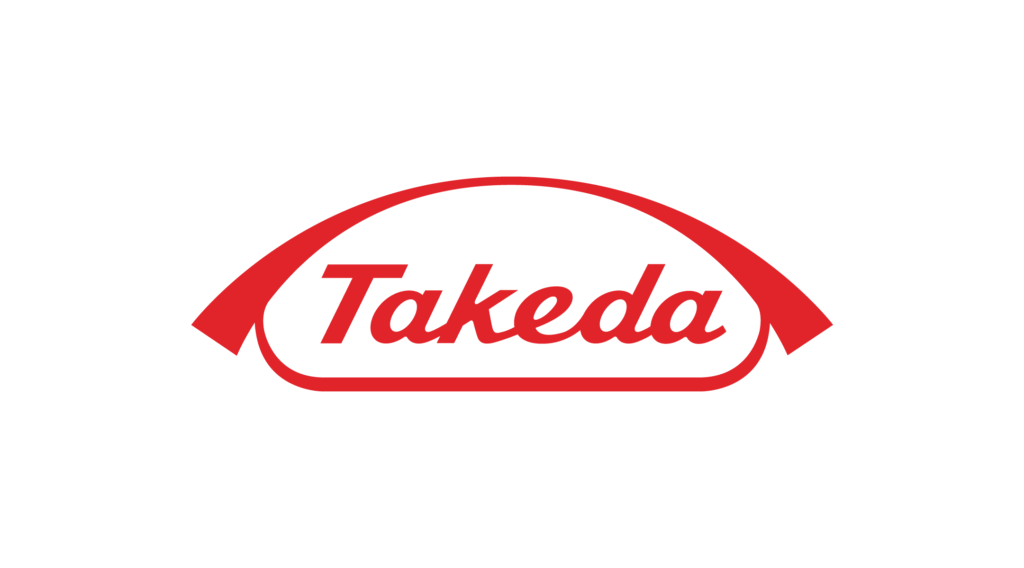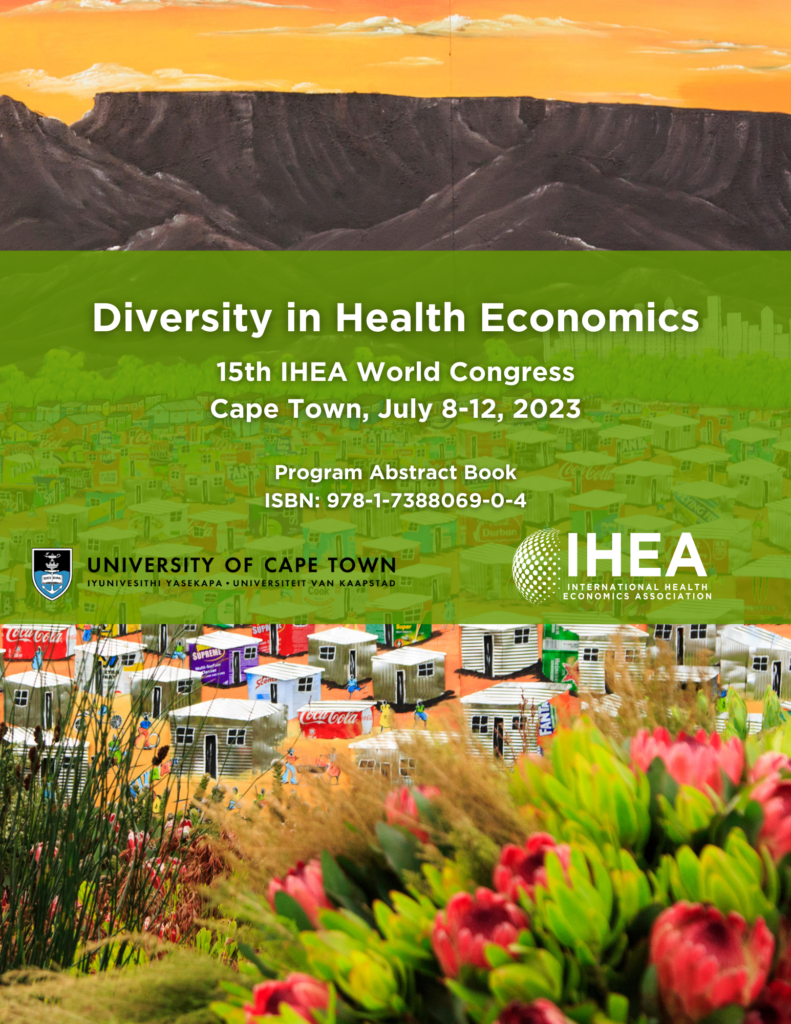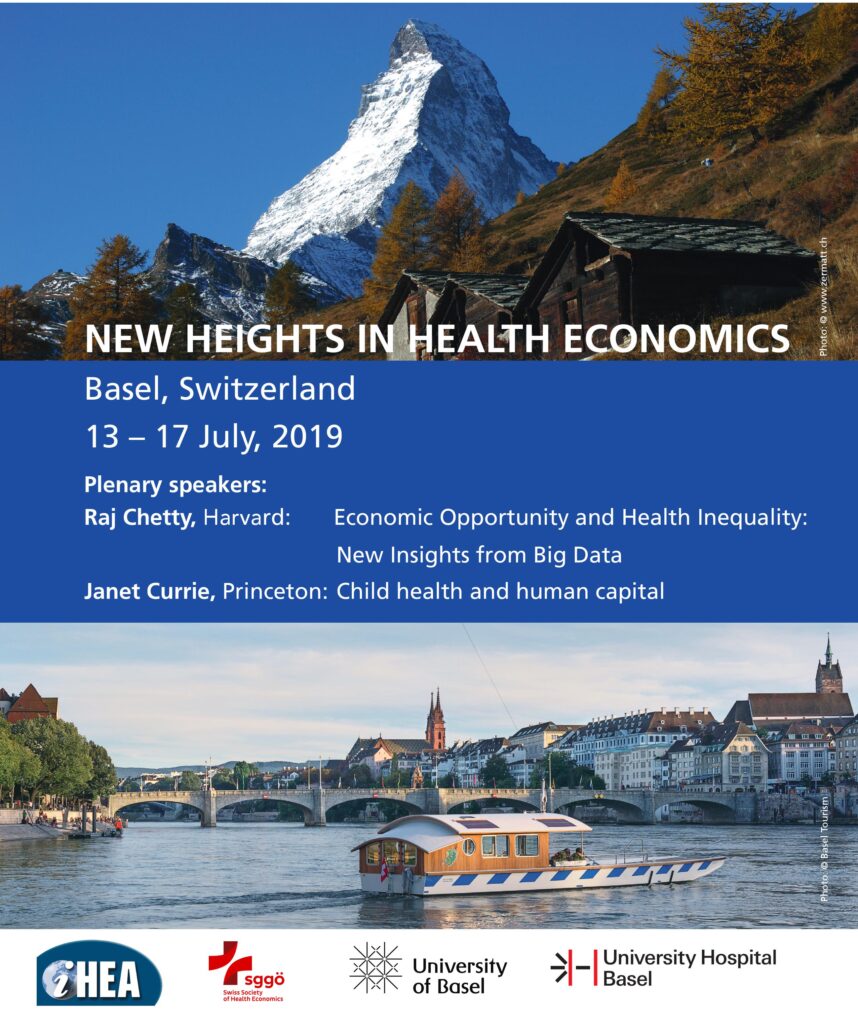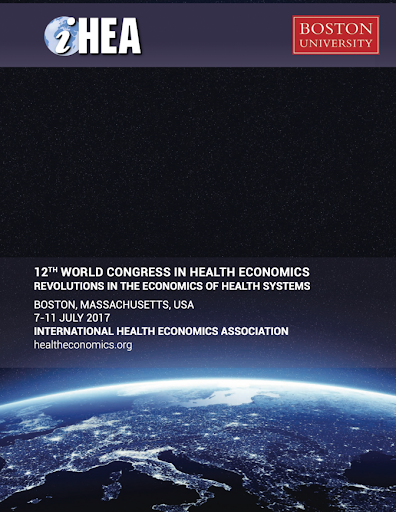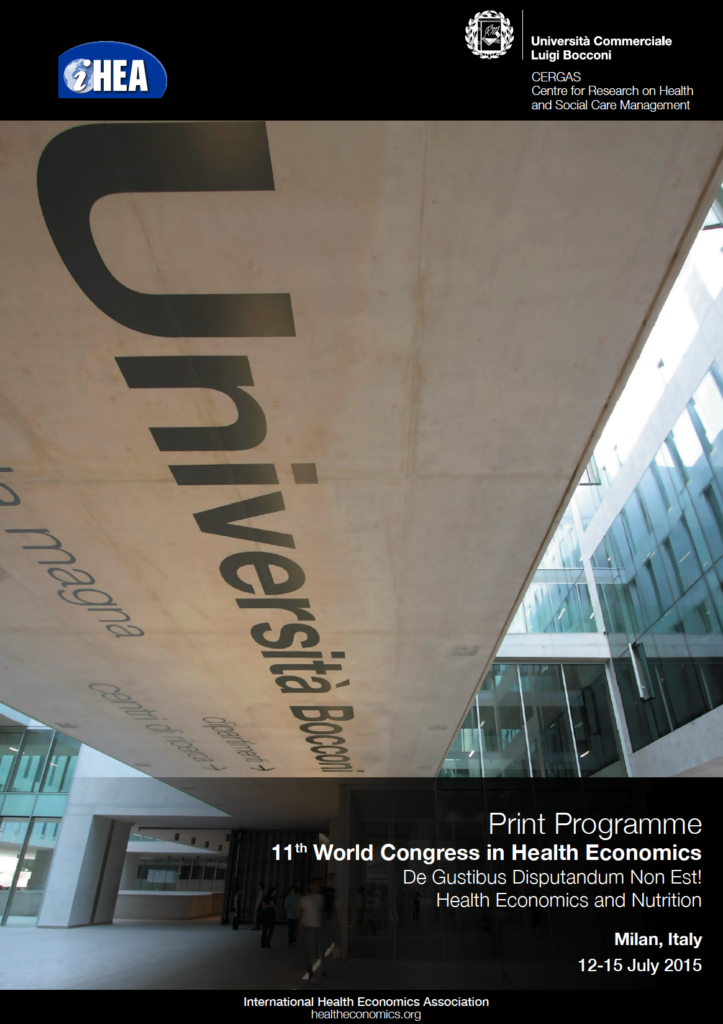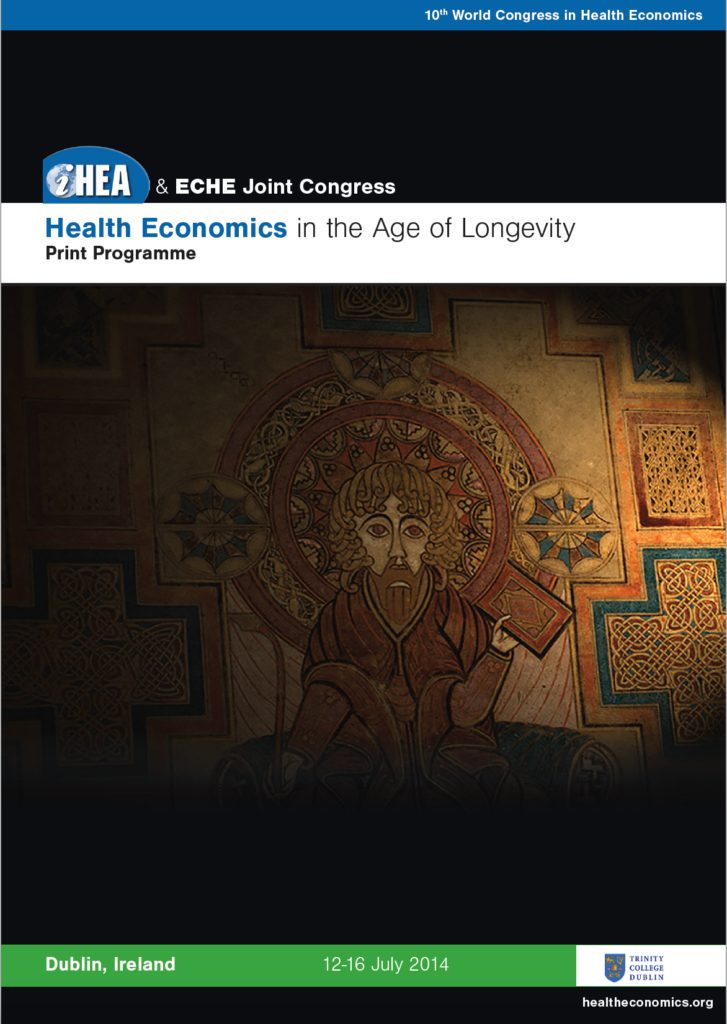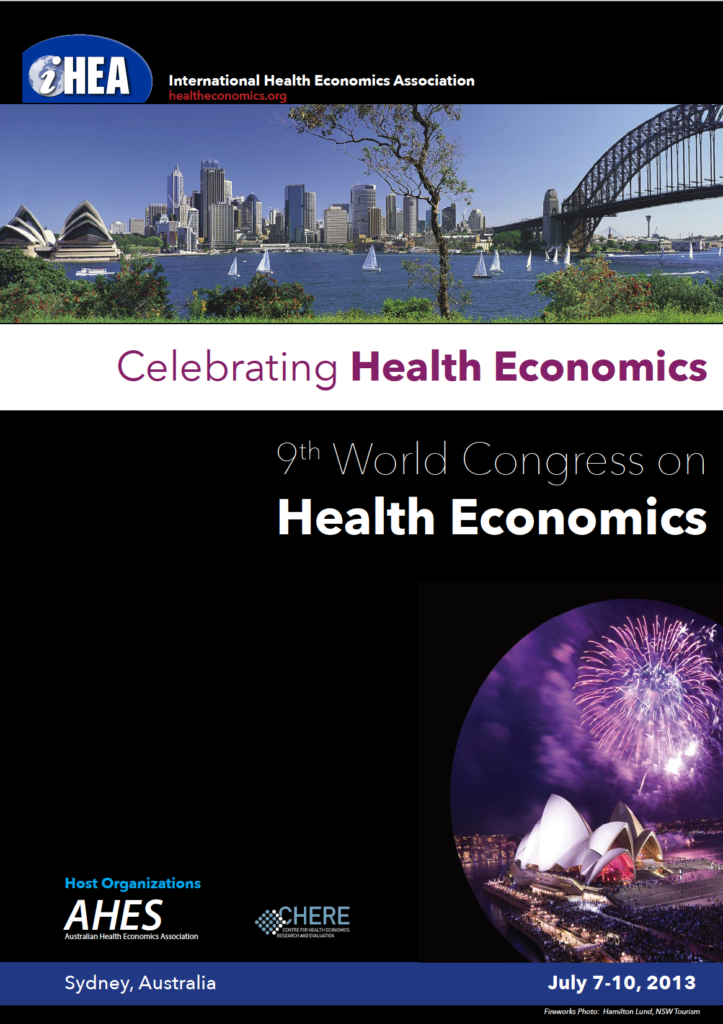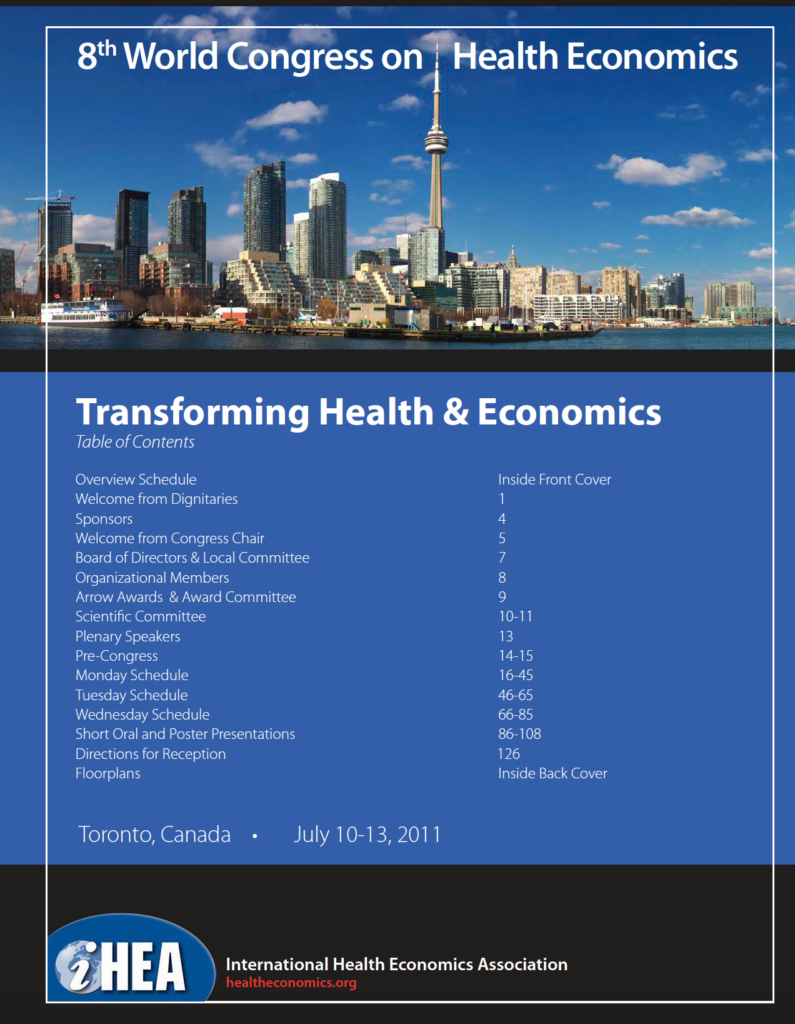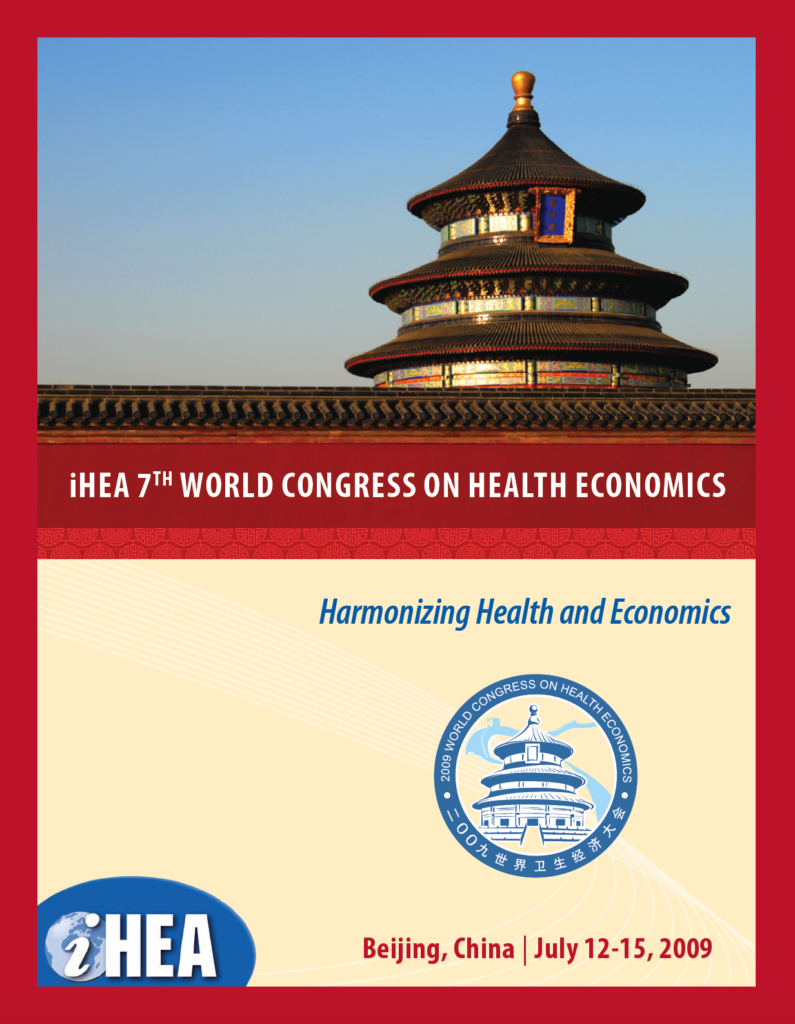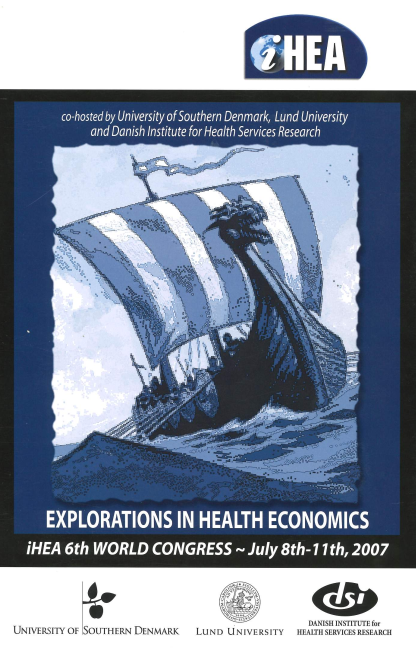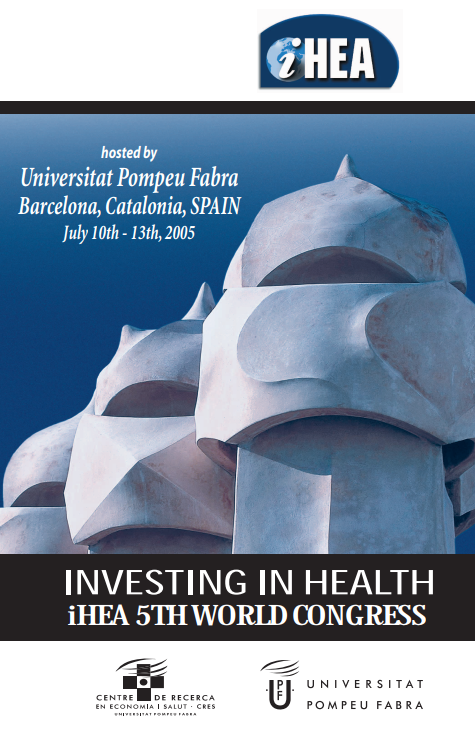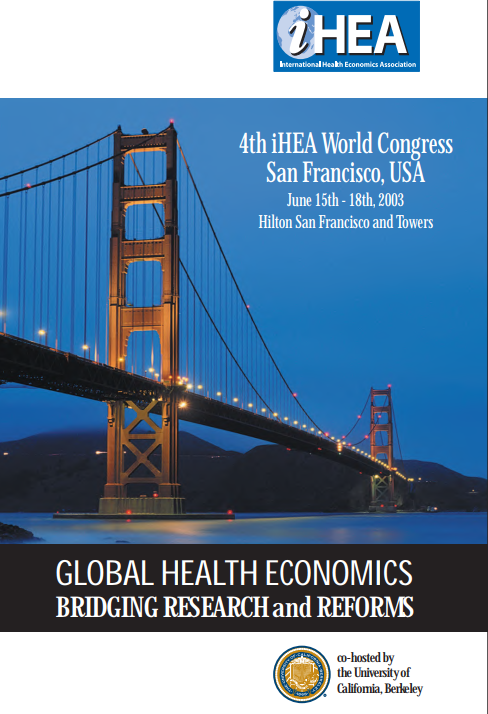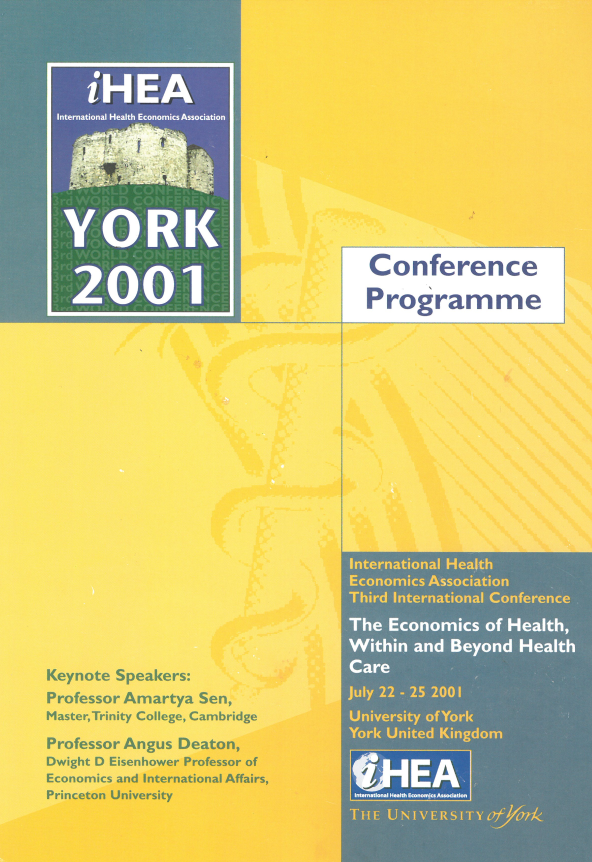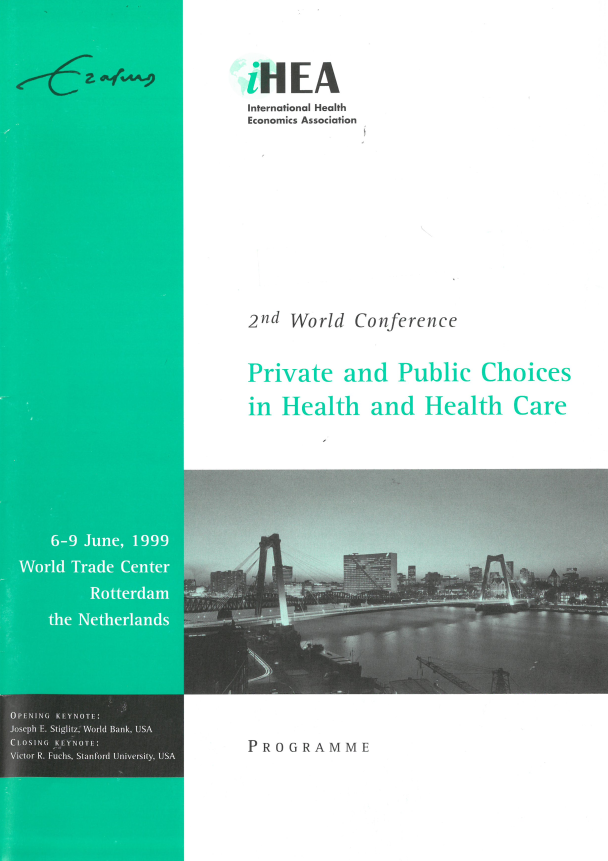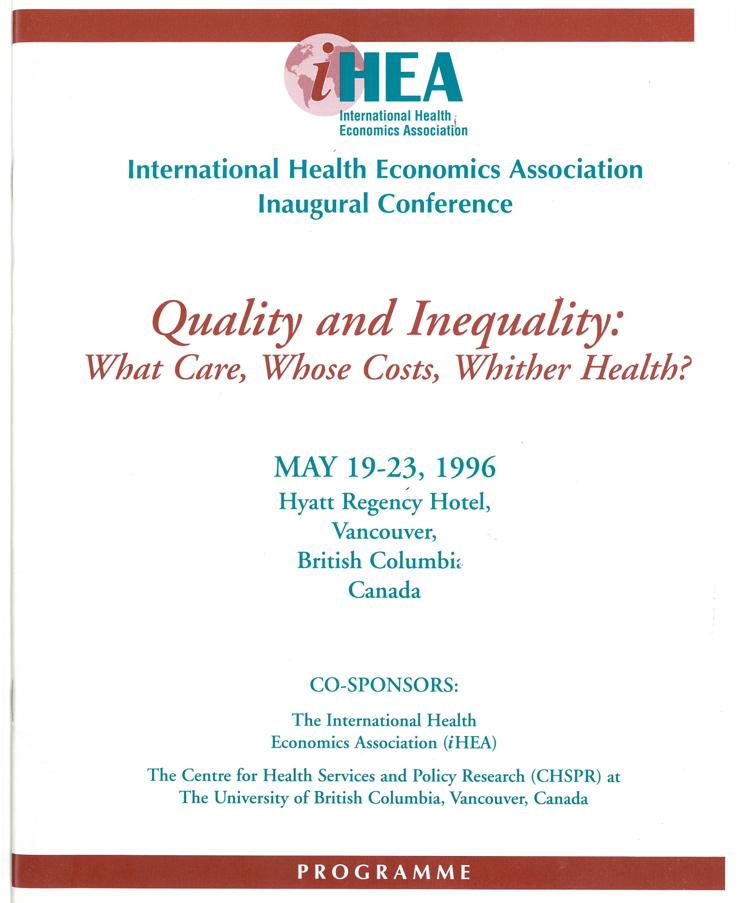Congress
The IHEA congress, held every second year, is the only global forum for health economists to engage around the latest methodological developments, present recent research findings and explore the implications of this research for health policy and practice. The IHEA congress includes presentations across the full spectrum of health economics’ fields.

Future Congresses
The 2027 Congress will take place in Latin America in July 2027. Stay tuned for more details coming soon!
This will be the first time the IHEA Congress is held in the Latin American region.
Past Congresses
- 2023 Cape Town
- 2021 Virtual
- 2019 Basel
- 2017 Boston
- 2015 Milan
- 2014 Dublin
- 2013 Sydney
- 2011 Toronto
- 2009 Beijing
- 2007 Copenhagen
- 2005 Barcelona
- 2003 San Francisco
- 2001 York
- 1999 Rotterdam
- 1996 Vancouver
- Recordings
- Scientific Committee
- Funding Partners
- Opening Plenary
- Pre-Congress Sessions
- Best Flash Oral Presentations
Opening Plenary: Using Economic Policy Instruments to Improve Health: Challenges and Opportunities
Professor Anne Marie Thow, Professor in Public Policy and Health, University of Sydney.
Opening Plenary: Key Issues in Indonesian Health System
His Excellency Budi Gunadi Sadikin, Minister of Health, Indonesia.
Some of the pre-congress session organizers have made available recordings of their sessions so that those not able to attend can benefit from viewing them. In some cases, the organizers have also made available copies of the presentations made in the session.
Lessons from Indonesia’s Strides Towards Universal Health Coverage (UHC) over the Last Decade
Organizers: Ministry of Health, BPJS Kesehatan, World Bank (Indonesia Office), University of Gadjah Mada, University of Indonesia, and Erasmus University Rotterdam/Rotterdam Global Health Initiative
*Unfortunately the morning session was recorded without audio – please review the presentations instead
Recalibrating Post-Pandemic Fiscal Health: Fiscal Policy, Health Financing, and Sustainable Recovery in Asia and the Pacific
Organizer: World Bank
Tobacco Taxation Frameworks to Optimize National Health Financing
Organizers: National Committee on Tobacco Control (NCTC), Indonesia
The Role of Social Health Insurance in Financing Healthcare in LMICs
Organizer: KEMRI Wellcome Trust Research Programme
Complex and Fragmented Financing Inhibits Innovation to Improve PHC Performance in LMICs: Evidence and Strategies for Reform
Organizer: ThinkWell Global
Evaluation and Implementation of Artificial Intelligence within Learning Health Systems
Organizer: Xiaoxi Yao, Lotus
Tackling NCDs and Obesity: The Role of Food Systems and Diets in Asia
Open Source Approaches to Economic Evaluation in Low- and Middle-Income Country Contexts
Organizer: Vanderbilt University School of Medicine
Early-Career Researcher Session
Organizer: IHEA Early-Career Researcher Special Interest Group, supported by Elsevier, Springer and Wiley
Building capacity for conducting Systematic Reviews of Economic Evaluation
Organizers: Stellenbosch University
Data Driven Decision Making for Universal Health Coverage: Leveraging Health Insurance Claims Data
Organizer: World Bank
Bridging Theory and Practice: Launch of Health Financing in Low and Middle Income Countries: The Path to Universal Health Coverage – A New Resource for the Health Economics Community
Organizer: International Institute for Applied Systems Analysis and London School of Hygiene and Tropical Medicine
Health System Comparisons: Collaborative Efforts to Harness National Data for Global Insights
Organizer: Brown University School of Public Health
Unfortunately These Sessions Were Not Recorded
Building Capacity for Economic Research on Tobacco Regulation in Low- and Middle-Income Countries
Presentation 1, Presentation 2, Presentation 3, Presentation 4, Presentation 5, Presentation 6, Presentation 7, Presentation 8
How Can Countries Overcome Bottlenecks to Primary Health Care (PHC) Provider Fund Flows and Provider Autonomy in LMICs
Presentation 1, Presentation 2
Infecting the Wallet: The Economic Burden of Healthcare Associated Infections in Malawi
Wala Kamchedzera
Experiment to Reduce Emergency Care Overutilization by Guiding Patients with a Triage Service in Germany
Sebastian Neumann-Böhme
What Contributes to Out-of-pocket Health Expenditure in Cambodia’s Uncovered Population? A Distributional and Decomposition Analysis Using Survey Data
Sovathiro Mao
Scientific Committee
The Scientific Committee (SC) plays a critical role in IHEA congresses given that the program is based on abstracts accepted through a rigorous peer-review process. An open call is issued for IHEA members to express their interest in serving on the panel to review abstracts submitted for each congress. Those who have served on the SC Review Panel for at least two recent congresses are eligible to be considered to serve as Program Chairs. There are two to three Program Chairs for each health economics field, who work together to finalize the abstract acceptances (from the review panel scores) and compile individual abstracts into coherent sessions. To be considered for the position of overall SC Co-Chair, an IHEA member needs to have served as a Program Chair for at least two recent congresses.
Members of the Scientific Committee for the 2025 Congress are listed below.

Paula Lorgelly

Karen Grépin
- Olufunke Alaba, University of Cape Town
- Hareth Al-Janabi, University of Birmingham
- Neha Batura, University College London
- Heather Brown, Lancaster University
- Terence Cheng, Harvard T.H. Chan School of Public Health
- Omar Galarraga, Brown University
- Hassan Haghparast Bidgoli, University College London
- Mohammad Hajizadeh, Dalhousie University
- Danny Hughes, Arizona State University
- Izabela Jelovac, CNRS (GATE Lyon-St Etienne)
- Meng-Yun Lin, Wake Forest University School of Medicine
- Céu Mateus, Lancaster University
- Paul Mitchell, University of Bristol
- Justice Nonvignon, University of Ghana
- Jacob Novignon, Kwame Nkrumah University of Science and Technology
- Sachiko Ozawa, University of North Carolina at Chapel Hill
- Stavros Petrou, University of Oxford
- Jane Ruseski, West Virginia University
- Nazmi Sari, University of Saskatchewan
- Eve Worrall, Liverpool School of Tropical Medicine
- Xiao Xu, Columbia University
Maiken Skovrider Aaskoven · Cristiana Abbafati · Yubraj Acharya · Folashayo Adeniji · Khurshid Alam · Paul Allanson · Lazaros Andronis · Laura Anselmi · Kjartan Sarheim Anthun · Micaela Antunes · Bolaji Aregbeshola · Jackline Aridi · Grace Armijos Bravo · Eric Arthur · Adam Atherly · Arthur Attema · Emmanuel Ayifah · Karan Babbar · Cate Bailey · Namal N. Balasooriya · Amrit Banstola · Ranju Baral · Michael Berger · Andres Berruti · Galina Besstremyannaya · Priya Bhagowalia · Stefan Boes · Corneliu Bolbocean · Igna Bonfrer · Frederik Booysen · Laia Bosque-Mercader · Fiammetta Bozzani · Eoghan Brady · Katie Breheny · Robert J Brent · Christian Brettschneider · John Buckell · Elzbieta Buczak-Stec · Norma Bulamu · Julie Campbell · Natalie Carvalho · Adriana Castelli · Chitalu Chama-Chiliba · Jen-Yu Amy Chang · Gang Chen · Susan Chen · Jinyang Chen · Zhuo Chen · Gowokani Chijere Chirwa · Chen-Han Chueh · Louisa Collins · Laura Cornelsen · Ana Correa Ossa · Edson Correia Araujo · Benjamin Craig · Enrica Croda · Alison Cuellar · John Cullinan · Angela Daley · Claire de Oliveira · Damien de Walque · Manuela Deidda · Angela Devine · Joseph Dieleman · Linda Dynan · Tobias Effertz · Habib Hasan Farooqui · Inna Feldman · Ama Fenny · Giulia Ferrari · Anne Fitzpatrick · Sebastian Fleitas · Harry (Ted) Frech · Emma Frew · Wolfgang Frimmel · Rui Fu · Ahmad Fuady · Jacopo Gabani · Yunwei Gai · Agnes Gatome · James Gaughan · Sean Gavan · Christian Gericke · Geir Godager · Irina Grafova · Eleanor Grieve · Harminder Guliani · Gulcin Gumus · Nils Gutacker · Nicole Hair · Piya Hanvoravongchai · Rubayyat Hashmi · Steven Hill · Ann Holmes · Michal Horný · Martin Howell · John Hsu · Frances Ilika · Adeel Ishtiaq · Aleksandra Jakubowski · Tricia Johnson · Christin Juhnke · Billingsley Kaambwa · Alphoncina Kagaigai · Fabrice Kampfen · Lucy Kanya · Anup Karan · Lukas Kauer · Marcus Keogh-Brown · Syed Afroz Keramat · Viktorija Kesaite · Jaewhan Kim · Seonghoon Kim · David Kim · Irina Kinchin · Stefan Kohler · Rositsa Koleva-Kolarova · Tekin Kose · Deliana Kostova · Emanuel Krebs · Narimasa Kumagai · Brendan Kwesiga · Stella Lartey · Lei Lei · Rolando Leiva-Granados · Changle Li · Li-Lin Liang · Ka Keat Lim · Meng-Yun Lin · Haizhen Lin · Stephan Lindner · Chengxu Long · Luis Loria-Rebolledo · Oscar Lourenco · Akim Tafadzwa Lukwa · Tom Lung · Fiona Lynn · Błażej Łyszczarz · Elham Mahmoudi · Rashidul Mahumud · Marshall Makate · Giorgia Marini · Sithabiso Masuku · Logan McLeod · Filip Meheus · Nidhiya Menon · Michela Meregaglia · Shafiu Mohammed · Flavia Moi · Patrick Moore · Toni Mora · Bernard Moscoso · Haizhen Mou · Christine Mpundu-Kaambwa · Peter Murphy · Mercy Mvundura · Nurhasmadiar Nandini · Arnab Nayak · Nichola Naylor · Rifkatu Nghargbu · Nhung Nghiem · Lien Nguyen · Hoa Thi Nguyen · Peng Nie · Felix Obi · Eric Obikeze · Yewande Ogundeji · Jason Ong · Obinna Onwujekwe · Ismael Ortega · Evans Otieku · Alfredo Palacios · Tom Palmer · Alfredo Paloyo · Sungchul Park · May Ee Png · Timothy Powell-Jackson · Mohammad Habibullah Pulok · Jianchao Quan · Troy Quast · Carlota Quintal · Ana Quiroga Gutierrez · Rajesh Kumar Rai · Rezwanul Rana · Adam Raymakers · Vivian Reckers-Droog · Carlos Riumallo Herl · Carlos Rojas Roque · Caroline Rudisill · Ramzi Salloum · Eirini-Christina Saloniki · Filipa Sampaio · Chris Sampson · Sabina Sanghera · Vishnu Prasad Sapkota · Abdur Razzaque Sarker · Sisira Sarma · Flavia Sarti · Reshmi Sengupta · Mujaheed Shaikh · Gopal Ashish Sharma · Suneeta Sharma · Sophy Shih · Ajay Singh · Kompal Sinha · Marina Soley-Bori · Susan Sparkes · Joanne Spetz · Divya Srivastava · Swati Srivastava · Christian Suharlim · Marufa Sultana · Kim Sweeny · Sara Syeda · Casey Tak · Ajay Tandon · Chengxiang Tang · Michelle Tew · Evelyn Thsehla · Florian Tomini · An Duy Tran · Aviad Tur-Sinai · Jorge Ugaz · Eline van den Broek-Altenburg · Giovanni van Empel · Veronica Vargas · Sukumar Vellakkal · Bruno Ventelou · Martin Vu · Josephine Walker · Cheng Wan · Caroline Watts · Edward Webb · William Weeks · David Whitehurst · William Whittaker · Daniel Wiesen · Ed Wilson · Marta Wilson-Barthes · Jingxian Wu · Muzhe Yang · Di Yang · Fadima Yaya Bocoum · Amanuel Yigezu · Tansel Yilmazer · Serena Yu · Dahai Yue · Wei Zhang · Qi Zhang · Hao Zhang · Yang Zhao · Ivan Zimmermann
Funding Partners
Funding partners play a critical role in the success of the IHEA congress, particularly to keep registration fees affordable and to support the participation of full-time students and delegates from low- and middle-income countries (LMICs).
Funding partners can make a general contribution to assisting with congress costs, or can specify how they would like their funds used. The main options for specified fund use are:
- To assist delegates in financial need: LMIC delegates and/or students
- Support for a specific event during the congress, such as the opening reception, the main social event, the mentoring lunch for students and early career researchers (ECRs), or pre-congress session for ECRs
Contributions of any size are greatly appreciated and all contributors will be acknowledged. There are specific benefit packages for contributions of USD25,000 and above.
Gold US$75,000 +
- 3 complimentary delegate registrations
- Half-day pre-congress session* (70 seater)
- Acknowledgements: Logo & name on program, website, plenary slides & banners
Silver US$50,000 +
- 2 complimentary delegate registrations
- Half-day pre-congress session* (30 seater)
- Acknowledgements: Logo & name on program, website, plenary slides & banners
Bronze US$25,000 +
- 1 complimentary delegate registration
- 90 minute pre-congress session* (30 seater)
- Acknowledgements: Name on program, website, plenary slides & banners
* All pre-congress session proposals will be reviewed for appropriateness by IHEA and local organizers
Funding partners for 2025 Congress
Gold:

Bronze:

